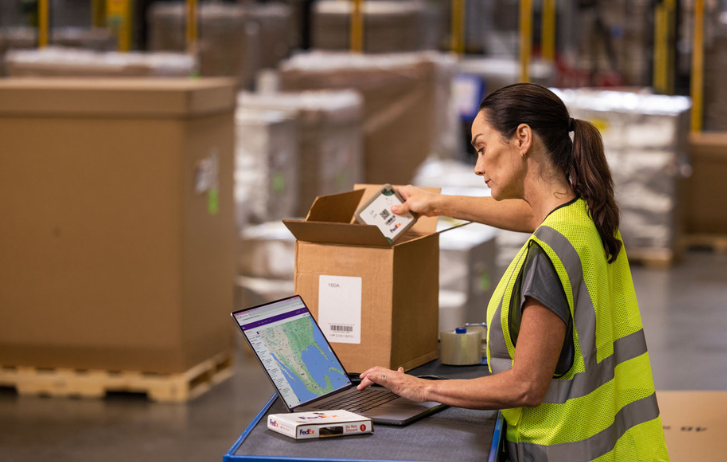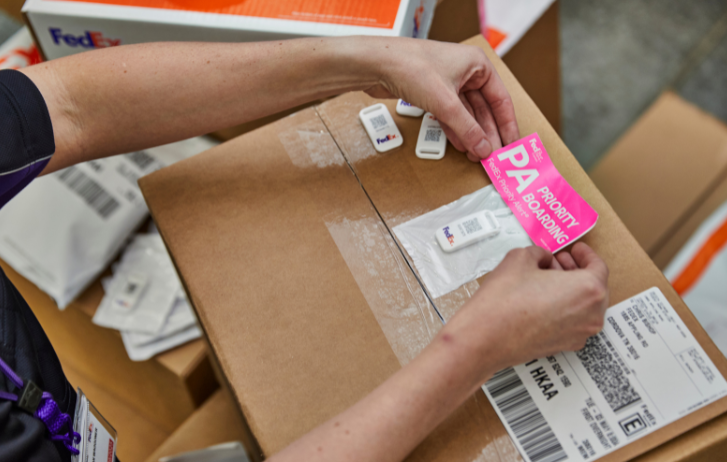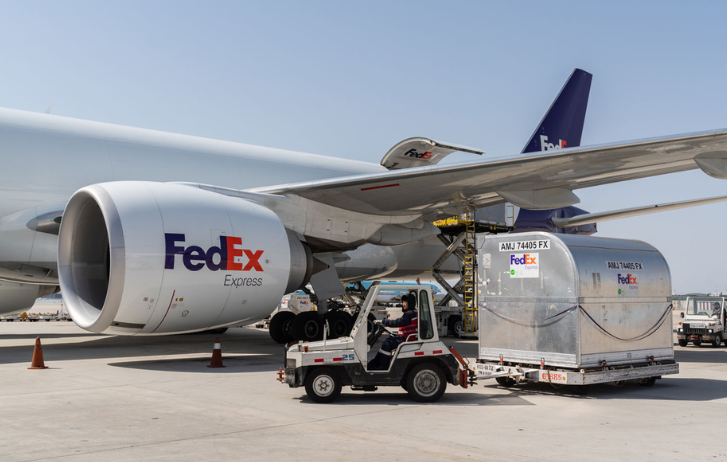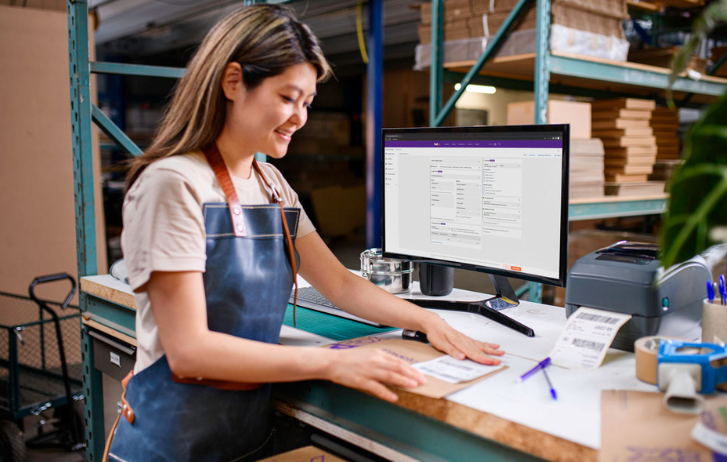
How To Keep Your High-Value Shipments Safe And Secure
By FedEx | August 22, 2024
High-value and temperature-sensitive shipments come with their own unique challenges. Here’s how your business can prevent costly damage and ensure safe, on-time delivery.
- From physical shocks to temperature shifts, your high-value shipments face many risks during transit.
- It’s essential to take precautions to safeguard critical cargo, including advanced tools like real-time tracking and sensor technology.
- Working closely with the right shipping partner can help you tackle logistics challenges and eliminate risk during the journey.
Shipping goods across the world can be a bumpy ride – literally. From packing to loading and final delivery, it’s important to get each step just right. And if you’re sending high-value goods, shipping gets even more tricky. But how do you know if what you’re shipping qualifies as high-value?
Aside from goods with a very high monetary worth or cargo value, high-value shipments can cover anything from important cultural artifacts and museum exhibits to precious cargo such as live animals.
In the world of healthcare and pharmaceuticals, high-value shipments could also be life-saving, such as donor transplants or irreplaceable clinical trial samples. You will need to safeguard these shipments from physical damage, interference and delay, or keep them at the right temperature to maintain integrity.
If you’re looking at ways to deliver high-value shipments safely, check out our guide to getting started. Here are the five best practices for transporting special cargo to customers on time and intact.
1. Invest in proper packaging
The right packaging can buffer your products against shocks and temperature shifts. This becomes extra critical when shipments are high-value. To ensure your cargo makes the journey in perfect condition, here are some packaging aspects to consider:
Cushioning material: Shock-absorbing materials like bubble wrap and packing foam can protect your goods against impact while minimizing movement.
Custom crates: For delicate cargo like fine art pieces, you may want to invest in crates customized to your item’s exact dimensions. If you’re shipping temperature-sensitive goods like pharmaceuticals, opt for insulated shipping boxes.
Cooling measures: Coolants such as dry ice, gel packs, and phase change materials (PCMs) will help you maintain the right temperatures during transit.
Clear labeling: Label your package as “fragile” or “temperature-sensitive” to inform handlers of any extra precautions needed. Don’t forget to include specific temperature ranges or handling instructions.
Security is another key concern for high-value shipments, so use tamper-evident tapes to seal your packages. These tapes deter theft and make it easy to identify if your shipment has been compromised.
2. Make contingency plans for delays
For irreplaceable shipments, contingency preparedness is essential. Supply chains can be disrupted by any number of issues. Extreme weather events, labor issues, and geopolitical unrest can strike at any moment, leaving your critical shipments stranded.
Luckily, predictive analytics tools are empowering businesses to plan ahead using insights on potential delays. At FedEx, we’ve just announced the launch of our innovative FedEx Surround® monitoring and intervention tool, a state-of-the-art solution designed to elevate logistics and supply chain management to higher levels of security and efficiency.
The Surround® monitoring and intervention system uses advanced sensor technology and real-time data analytics to provide continuous monitoring and proactive interventions for shipments worldwide.



SMEs can now go beyond tracking. The solution enables us to deliver real-time intervention, ensuring that shipment risks are dealt with before they become issues. It’s a game-changer for businesses relying on just-in-time delivery for high-stakes shipments.
The monitoring tool also leverages machine learning and an AI-powered dashboard to communicate delay predictions and weather alerts in the lead-up to shipment dispatch. When you have a clear overview of potential risks, it’s easier to come up with a Plan B.
3. Look for expedited shipping services
When it comes to safe delivery of your sensitive packages, expedited shipping is the best way to go. Fewer stops and transfers translate to less package handling, minimizing the risk of damage to your high-value shipments. A shorter duration also makes it easier to ensure cold chain integrity for your perishables.
Choose a shipping partner with expertise in expedited freight and temperature-controlled deliveries. Look for shipping options that can fast-track your time-sensitive shipments at every step of the way, with priority handling to deliver critical packages faster.
4. Tap into real-time tracking technology
High-value can often mean high stress. When precious cargo is in transit, the waiting period can be nerve-wracking for both sender and receiver. Real-time tracking technology makes sure you always have eyes on your package to prevent loss or damage.
With the rise of IoT-enabled tracking in logistics, businesses can now receive alerts on their shipments in real time. By attaching smart sensors to your packages, SMEs can monitor their condition throughout the trip – not only for location but also temperature, humidity, shock factors, and more.
If you’re an SME, work with your shipping partner to get the visibility you need. For instance, FedEx Surround® offers three tiers of monitoring features to give businesses the insights most relevant to them:
- FedEx Surround® Select provides global visibility of where your packages are in near real-time.
- If you need intervention support, FedEx Surround® Preferred responds to on-demand requests such as expediting your shipment.
- For even more hands-on support, FedEx Surround® Premium includes on-package sensor monitoring. When your shipment is at risk of delays or temperature changes, our dedicated intervention specialists will replenish coolants and work to complete your delivery as soon as possible.
5. Check your documentation and compliance
Getting your documentation in order is key to avoiding delays at customs. Incomplete paperwork can hold up your shipment, leading to frustrated customers and damage to temperature-sensitive goods.
Double-check all your paperwork – such as invoices, certificates of origin, and customs declarations – to ensure they’re accurate. It’s essential to provide detailed product descriptions and state the right values for them to smoothen the clearance process.



Since import regulations can vary widely between countries, it pays to do your homework on compliance as well. For example, dry ice is classified as dangerous goods and comes with country-specific packaging requirements.
Products and packaging may face additional regulations in your target market. Goods like antiques, food items, and medicines may call for special permits. Remember, the right logistics provider can help simplify customs clearance and offer advice and support on regulations.
Get peace of mind for your high-value shipments
While high-value shipments may cost more to transport than your standard items, it’s well worth the planning and precautions. The right shipping partner can help ease the load, giving you the insights and support to tackle any challenges your shipments face along the way.
Businesses in APAC can now safeguard future shipments with FedEx Surround®. Designed to support a wide range of industries including healthcare, aerospace, and high tech, it may provide the ideal solution to protecting what’s most important to you and your customers, stakeholders and investors.
SHARE THIS STORY
Trending Topics
Most Popular
Sign up now and save on your shipping rates!
Sign up now and earn discounts by shipping instantly with FedEx Ship ManagerTM at fedex.com.
Recommended For You

The Next-Gen Sensors Transforming Healthcare Logistics
Healthcare shipments require delicate handling. The right sensor technology ensures products are transported safely.
Read More
8 Most Unusual Shipments In The History Of FedEx
From priceless artifacts to live animals, FedEx leverages its global network to ship rare and unusual items.
Read More
From Flowers To Frozen Foods: Difficult Items To Pack And How To Protect Them
Items like flowers, seafood, and electronics can be difficult to pack. Here’s how to prepare your sensitive packages for safe delivery.
Read More

